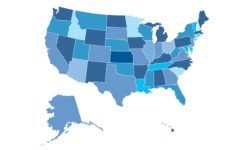Lightning on Campus: Your Vulnerability Might Shock You
Have you conducted a hazard analysis of lightning strikes? With the exception of about only six states, lightning risks should be on your radar.
How Florida State Addresses the Hazard
Florida State University (FSU), in Tallahassee, Fla., has a very extensive lightning safety program. It is important to note that this program applies to the entire university and not just its athletics program. The same policies and procedures are utilized by Campus Recreation, Housing, Student Union, Police and Emergency Management.
For daily operations, FSU contracts with a third-party weather service company to provide automated lightning alerts via pager, SMS text, E-mail and desktop computer to key university officials. When lightning is detected within a 15-mile radius of university properties, the system sends a lightning advisory message. When lightning is detected within an 8-mile radius, a lightning warning is sent.
The system also provides live lightning data on a map, superimposed with radar imagery. With this technology, we can actively monitor where lightning is occurring, frequency rate, direction of movement and more.
During athletic events, all lightning advisories are announced to the game officials, staff, coaches, athletes and spectators. When a warning is issued, all play is immediately ceased, the fields are cleared, and spectators are advised to seek shelter.
Through some lessons learned from previous football games, all efforts are made to reinforce this message: all entertaining music is ceased, all scoreboards display a vivid warning message, announcements are made repeatedly, and security staff encourage people to take action. In the event of a lengthy delay, spectators are told that they could call a recorded hotline (850-645-GAME) to get the latest weather update and the time play will resume.
Similar procedures are in place at FSU’s various campus recreation and intramural sports facilities, band practice fields, the circus (yes, FSU has a circus), student union events, and other large outdoor gatherings with more than 1,000 attendees, such as ice cream socials.
During major events – such as home football games where as many as 85,000 people can be gathered inside the stadium, with an additional 10,000 unticketed tailgaters hanging out in the parking lots – additional resources are brought to bear. FSU emergency management (EM) officials are incorporated into the incident command post and actively monitor the radar and lightning detection systems. FSU EM also coordinates directly with the NWS Office in Tallahassee via NWSChat or direct telephone conversation. Similar setups are used when FSU hosts any NCAA post-season tournament play such as baseball Regionals and SuperRegionals.
“Popcorn” Storms Develop Without Warning
One notable caveat must be made, predominantly for those in the southeastern United States. Thunderstorms and lightning may be easy to track on radar and
with detection systems when they are moving along, such as passage of a frontal boundary in the late fall or spring. This is the case for most Midwest storms as well. However, typical summer pop-up or “popcorn” thunderstorms that frequent in the South do not move much. They will develop right above you, and you don’t see them coming. That first bolt of lightning can be yours, rendering any detection system or process useless.
In these cases, it is recommended that key officials receive severe weather spotter training from the NWS. They will teach you some skills you can use to “read” the sky and determine if that white puffy cloud over your head may be developing into a thunderstorm.
Lastly, all schools, colleges, and universities should become NWS StormReady institutions. This program ensures that you have the capabilities to receive severe weather warnings, understand them, and disseminate them to those in need. It also ensures that your emergency notification and warning system is adequate for relaying severe weather warnings. The NWS is also pilot testing a new lightning safety recognition program specific to your lighting program.
Dave Bujak is the emergency management coordinator for Florida State University.
If you appreciated this article and want to receive more valuable industry content like this, click here to sign up for our FREE digital newsletters!
 Leading in Turbulent Times: Effective Campus Public Safety Leadership for the 21st Century
Leading in Turbulent Times: Effective Campus Public Safety Leadership for the 21st Century
This new webcast will discuss how campus public safety leaders can effectively incorporate Clery Act, Title IX, customer service, “helicopter” parents, emergency notification, town-gown relationships, brand management, Greek Life, student recruitment, faculty, and more into their roles and develop the necessary skills to successfully lead their departments. Register today to attend this free webcast!







